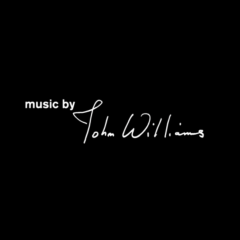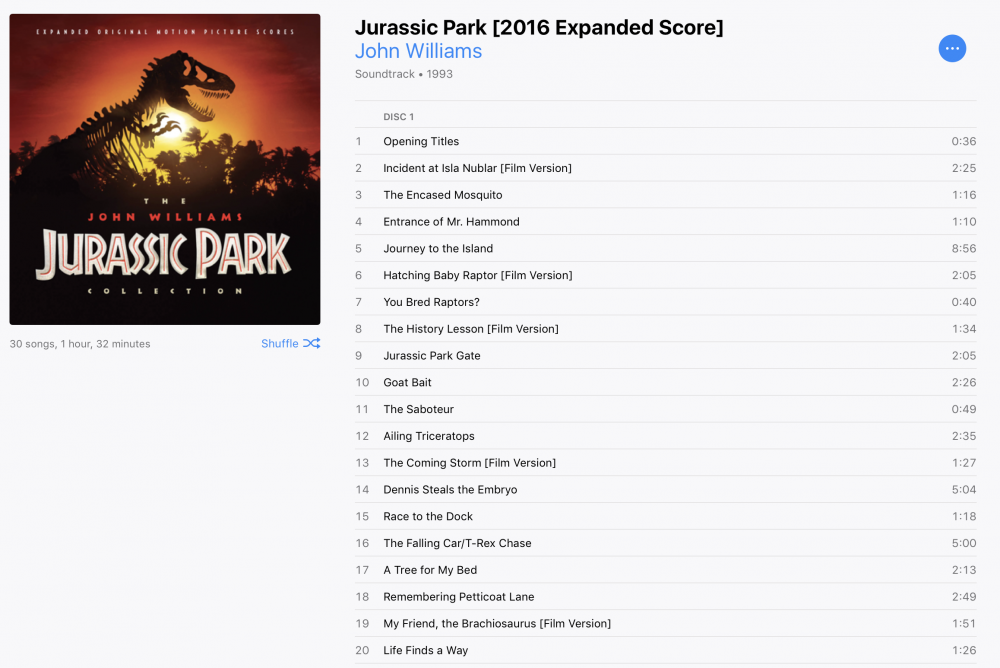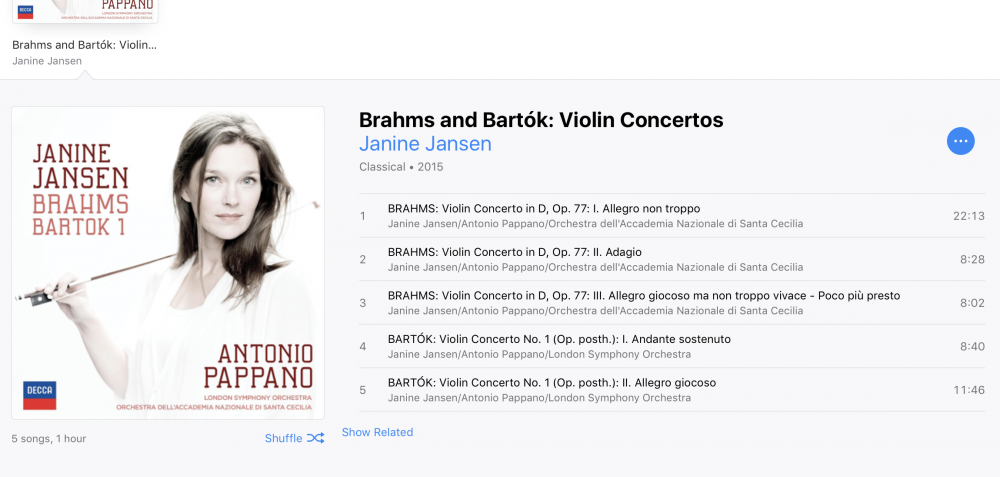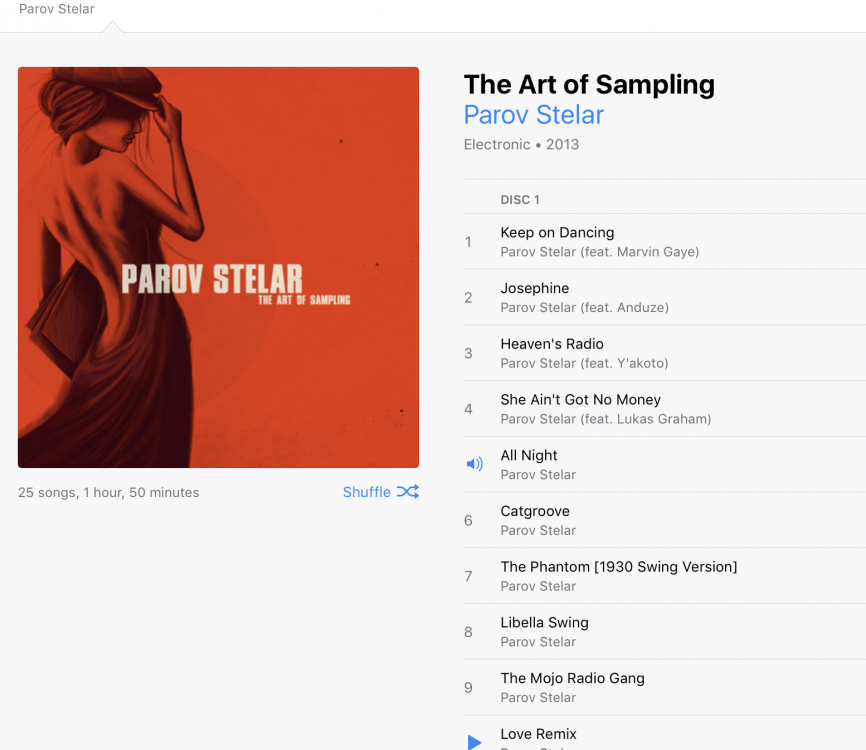-
Posts
1,484 -
Joined
-
Last visited
-
Days Won
1
Posts posted by Bayesian
-
-
3 hours ago, Philippe Roaché said:
Years ago, people trashed the titles of Episodes I and II, but Solo: A Star Wars Story is easily one of the worst titles for a movie I'll ever hear.
How so? It fits the pattern set by Rogue One. What would you sooner see it called?
-
They say familiarity breeds contempt — maybe it’s just you need some time away from JW to appreciate why you loved his music in the first place.
On a related note, I seem to recall reading somewhere that a person’s musical preferences are established in their late teens/early twenties. So if you found JW at that age, you may well always come
back round to him the rest of your life. I sure expect that’ll be the case for me.
Also, as our culture gets shallower and shallower in the years ahead, we who are lucky enough to know how it once was will probably grow to cling to JW’s artistry like a lifejacket. JW writes better music at 85, using pen and paper, than anyone working today with the “benefit” of software, sample libraries, and hordes of assistants. He is a product of four generations ago, when (I believe) people generally simply tried harder at things and thus became better at doing them.
-
Obvious question, surely, but do we have any idea what happened to the missing masters (or whatever those elements are)? Or, better yet, is there reasonable hope they’ll ever be found? If there isn’t, MM could just get going on what’s known to exist.
-
5 hours ago, Brundlefly said:
I can. At least 2000 of them would be bought by people who already own the old version.
Count me in for one of the 3,000 that remain. I would absolutely love to have a copy of an expanded Hook that was properly edited and compiled — and it would save me from toying with the idea of paying exorbitantly for the 2012 version on the used-CD market.
-
I expect Ep. IX will be his last star wars score. He will have closed out three trilogies spanning five decades; an achievement unmatched by anyone in film and unlikely ever to be seen again. It will be the perfect coda. Thereafter, as others have said, he’ll compose for Spielberg (who matches his artistic sensibilities unlike any other director).
Starting another SW trilogy with Rian runs the risk of spoling the perfect coda if for any reason he can’t finish all three. And we’ve already had Giacchino score an off-canon story and whoever’s assigned to the Han Solo one. Desplat was on board once and easily could come back, this time for Rian.
The core canon (I-IX) belongs to JW alone. The affiliated stories began under different composers and it makes sense to stick to that for whatever Rian is cooking up.
-
When do you think they’ll press the CDs of the OST (or have they been pressed already)? To get them in stores and people’s mailboxes by the 15th, they’ll need at least a few days to get them shipped from factory to warehouse to dist center to fedex/ups/usps truck, right?
Just curious; I know nothing about the process.
-
1 hour ago, king mark said:
40 minutes. I don't share all your optimism it might be the complete score. The most likely scenario is that the score is the usual hour and a half/ two hours score but they only put 40 minutes of it on c.d. and we get screwed as usual
IIRC, JW only spent a few days in the recording studio, right? Like 3 or 4 days? Is that enough time to get much more than 40 minutes of music put down?
-
4 hours ago, Jay said:
Not in any official capacity - just receive a namecheck in the Special Thanks of ET and CE3K. I believe I get a more formal credit on a release coming out next year sometime.
Aha, now I understand why you wrote earlier that you already had CE3K!
Never quite realized how involved you were in all this, Jay. That’s pretty cool.
-
Ordered! Titanic too. Cannot wait to give CE3K a whirl on this new presentation.
Titanic was ordered today more because it could well sell out before I ever got back around to coming for it. For the sake of my credit card balance, it had better sell out fast. (JUST KIDDING, to anyone who doesn't take jokes.)
-
6 minutes ago, TheGreyPilgrim said:
Does it make you feel more secure on your own taste to let everyone know how uncomfortable you are with a list praising those composers?
Sigh. It’s called humor. That’s what “/nervous chuckle/“ is for.
-
-
Coming to this topic late; nonetheless, here's my list:
1. John Williams: Unsurpassable, for all the reasons stated here and throughout these forums. To me, he is the ne plus ultra of film music the way Beethoven is of classical -- simply untouchable.
2. Danny Elfman & Jerry Goldsmith: I've loved DE since Batman and Edward Scissorhands. I discovered JG much later (only in the past couple years, actually), but he grown on me big time. Both know how to write really catchy themes and orchestrate with flair.
3. JNH & Alexandre Desplat: JNH is hit-or-miss, but when he hits, like with Lady in the Water, or Waterworld, it's plain awesome. As for AD, I think he easily counts as one of the most sophisticated and musically intelligent of the "newer" generation of composers. I love his clinical sounding scores (Imitation Game, etc.)
4. James Horner: JH wrote some incredible melodies and knew how to use the orchestra with the best of them. Rocketeer, Casper, Amazing Spider-Man, Avatar, Mask of Zorro... I could not live without them.
5. Alan Menken: No one's mentioned him yet, but he is to my mind about half the reason there was a Disney Renaissance in the first place. Aladdin, Little Mermaid, B&B, Hercules... those were just Broadway shows in the guise of animated films, and he wrote the showstoppers that made them so. He gets up here for that decade of work alone. Unfortunately, I know little of his more recent work.
6. Honorable mentions: Giacchino, Poledouris, Doyle, and Kamen. Maybe some Silvestri. I know little of Powell, so I can't rank him yet.
After Williams, nos. 2 through 5 are basically tied with each other. And Zimmer... well, how many composers in Hollywood are there? Take that number and subtract three. Zimmer basically slots in there, just before Jablonsky and Junkie XL.
-
-
12 minutes ago, Disco Stu said:
Nope. They're doing the limited release at the end of December specifically so it can be considered a 2017 film for awards.
Ah, gotcha.
-
Preordered too! BTW, if the film’s limited release is in 2017 and its wide release is in 2018, does that make it a 2018 film?
-
The OST should arrive in my mailbox about 9-10 hours before I see the film on the 15th. I’m going to try to go in cold, since some people have commented about the pleasure of waiting to hear the music for the first time within the context it was written. But those 10 hours will be a long slog for sure.
My plan is to rip the CD into iTunes the moment it lands in the mailbox, sync it to my phone, and blast it hard in the car on the way home from the theater. And hand my phone over to my wife so she can keep me from playing it on the way TO the theater.
-
On 11/11/2017 at 5:03 PM, rough cut said:
TBH, I never understood why arbitrarily capitalizing is the norm. Are the words “in” and “the” lesser of lesser worth than the word “interview”?
I am not posting this as a jab at anyone, it is a legitimate question because you see it everywhere these days... words like “for” and “to” are doomed to lower case and I’ve never understood why.
I mean, isn’t it crazy that the rule is not to capitalize articles, prepositions and coordinating conjunctions? I mean... Why, exactly?
Can someone please tell me why?
They call it "title case" and it's for stylistic reasons (which to me translates as visual comfort). I like the idea, although it gets hard to know when to violate the rules just right: Is "Down By The Seaside" really worse, visually, than "Down By the Seaside" or "Down by the Seaside"? (My preference nonetheless happens to be the last one.)
On a related note, I vacillate over whether the albums are best relabeled in my iTunes library as "Star Wars Episode 4: A New Hope", "Star Wars: Episode 4: A New Hope", "Star Wars: A New Hope" [no "Episode 4" at all], "Star Wars: Episode 4 — A New Hope", or something else. Right now I prefer the last one. Something about two colons in the same line never sits quite right with me. That third option is mostly a nonstarter for me because without the episode number the alpha order of the albums doesn't reflect the actual order of the series. But then again, it seems this is how this third trilogy is often being referenced..
-
-
4 hours ago, Brian99_1 said:
Wow finally got a chance to read the whole thing. Excellent work Jay!
like others have mentioned it really shines a light on the work people like MM do for these releases and makes us fans all the more appreciative.
On on another note i don’t want to seem mean spirited here but I wish more interviews / articles on FSM took this approach. I’d still be a subscriber then.
There's nothing to feel mean spirited about with that comment. Interviews are important if you find the subjects meaningful. Since you're unlikely to ever get to interview the person yourself, you depend on the interviewer to try to glean details that you'd never otherwise get a chance to learn about. My wife and I were at Comic-Con this past July and watched a replay of some of the Saturday Hall H panels. Chris Hardwick was interviewing the Justice League cast and it was atrocious. You learned NOTHING from it that would have merited a 20-hour wait in line. "How was it to work with this group?" "Oh, it was amazing." Yeesh. Maybe that's why any lingering interest I had in JL evaporated on the spot that day. (For the record, Ray Miller was probably the only one who bothered not to phone it in and gave answers that were not completely asinine or empty.)
I may not have heard of the term "mechanical rate" before reading the MM interview, but it took me only 15 seconds on Google to learn what it means, and now I have some trivia about how a tiny part of the music industry works. That's rewarding to me. That's what a good interview should allow for. Again, thank you, Jay. Maybe you could one day interview Shawn Murphy or Conrad Pope -- I for one would love to learn a bit about the intricacies of sound engineering or orchestration!! Or any of the folks at JoAnn Kane. Or...
-
- Popular Post
- Popular Post
6 hours ago, Brundlefly said:This could have been a standard interview, but your questions made it actually an interesting interview. There are many professional interviewers that could learn from you.
And am I mistaken or is it the original La-La Land cover of The Lost World, for the first time?

Could not agree more. Terrific interview, Jay! It's refreshing to come away after reading a great interview like this with some of the minutiae of the process -- and in my case, to learn that the work involved is actually WAY greater than I expected. It brings my appreciation and respect for the work of MM, LLL, et al. to a whole new level.
Most interviewers are pathetic. They hardly ever let you glimpse what it's really like to be the interviewee because they never ask the insider questions. But it's exactly the answers to such questions that allow people to learn how the sausage is made, so to speak. That's where the novelty lies.
After reading this interview, I no longer have ANY issue with the prices charged for an expanded limited release of a JW score. Once you realize how MM, LLL, and seemingly half of the film and music industry back office in SoCal cooperate to produce such a niche product, there is nothing to feel but total gratitude. (And when that event happens over and over and over in the span of a few years in the JW oeuvre, it's nothing short of miraculous.)
-
- Popular Post
- Popular Post
On 9/14/2017 at 4:54 PM, OneBuckFilms said:Mine arrived last night, and I can tell you: It's a pretty cool release.
Really enjoying it.
Received mine this morning, and agreed, it's terrific. Loving every bit!
I'll mention it here, since it's as good a place as any -- I've always loved "Deacon's Speech" and especially the part from 1:54 to 2:09, where the buildup of the previous two minutes gives way to a monumental climax. (It's the same on the OST as on the new release.) Part of what makes it magical for me is how this part is used in the movie -- the little girl is talking about how the Mariner is going to rescue her because he's unstoppable, and the scene is intercut with shots of him unstoppably coming to rescue her. The musical climax is doing the same thing her words are: mythologizing him. It's an amazing moment.
- Jay, Pieter Boelen, crumbs and 1 other
-
 4
4
-
Interesting point about TV shows. I don't have any in my library, but now I wonder what I'd do about their names if I ever did.
-
My fixation on good artwork stems in large part from longstanding inconsistencies in the way it's presented. Sometimes, it's got ugly white edges where (presumably) the scanner caught some of the glass and no one re-oriented the scan or cropped in it ever so slightly. And for many new releases, lovely high-res art is available, which is great, but it also plays up how poorly its low-res peers from years ago look by comparison.
I've had a perfectionism streak in me for a long time, but it's only been a few years since I've learned how NOT useful it is in much of life. It makes you less productive and gives you chronic dissatisfaction (since you always think it could be better, and if only I'd spent more time on it (but I already spent way more time than I should have), etc..). I've finally been able to break away from that to a modest degree and it's really liberating. But on legacy projects (like my music library) where my perfectionism was running at full tilt, I feel I have to continue in the same vein so as not to repudiate the hard work of my younger self.
Good on all of you who can resist the temptation! Wish I knew earlier it's not the metadata that matters; it's the music.
18 hours ago, Woj said:Scintillating, most of what you said is interchangeable with the way I manage my collection. Though I don't add life years to their names, and I've gradually dropped cover size to 400x400 because of space.
I might like to learn of your naming conventions. Mine keep changing as I go.
You're the first person to express some tentative interest in my naming ways! It's probably easier for me to upload some screen-grabbed examples and make some notes after...
My track-naming rules include lowercasing conjunctions and similarly short words ("as", "and", "or", "a", etc.), although there are a bunch of exceptions. The easiest way to summarize this is that I try to follow the typesetting conventions of newspaper headlines, book titles, and magazine articles. I try to reserve square brackets for informing on a fundamental attribute of the track unrelated to its name (for instance, [Reprise], [Alternate Cue], [1979 Revised Version], etc.). For classical albums, I always strive for the following sequence: Composer: Name of work and key ("Nickname of work"): Mov't #. Name of mov't in sentence case. For jazz, R&B, pop, etc., I always put the featured artist in brackets WITH THE ARTIST. Seeing featured artists identified after the name of the song has always driven me nuts.
What approaches do you use?
-
I've been tempted to let it go at various times over the years, but never could bring myself to do it. One day...







Solo: A Star Wars Story (Ron Howard 2018)
in General Discussion
Posted
I dunno. That kind of title implies to me that we’re in for a series of adventures (of which this is but one), and this movie is just a one-off, right? And by dropping Han from the title, there’s just a hint of insider-ness projected alongside the two-syllable pithiness.